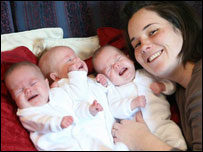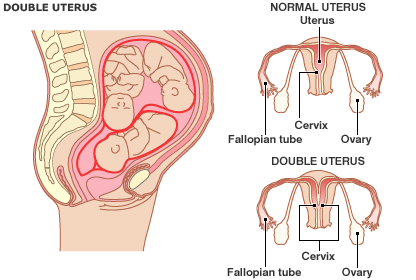|
AN ARTICLE HOSTED BY IMPREGNORIUM.NET TRIPLETS FOR WOMAN WITH TWO WOMBS
A UK woman with two wombs is
believed to be the first in the world with the condition to give birth
to triplets. The girls had to stay in hospital for nine weeks after being born seven weeks early by Caesarean, but have now returned home to their parents. The odds of having triplets from two wombs are about 25 million to one.
Only 70 women in the world are known to have been pregnant in two wombs, reports suggest. The condition, which is actually called uterus didelphys, affects one in 1,000 women in the UK. In Miss Kersey's case, the babies were conceived from two eggs - one in each womb - which were fertilised at the same time by two different sperm. There are very few world firsts nowadays, but it may be one. One egg then divided, producing identical twins, while the other developed into a single baby. Hannah and her partner Mick Faulkner said they were "over the moon" at how healthy and happy the girls are. Hannah said: "They are three lovely and incredible children, all with very different personalities. "Gracie seems to be the ringleader - maybe because she grew up in her own womb. "Ruby is very laid back and quiet, happy to sit and watch what is happening around her.
WOMB ABNORMALITIES "Tilly, who was the baby that struggled to survive inside me, is a real fighter, wanting to keep up with her sisters and not be left out." Dr Simon Grant, a consultant at Southmead Hospital who delivered the babies, said: "There are very few world firsts nowadays, but it may be one." Mr Ellis Downes, consultant obstetrician and gynaecologist at Chase Farm Hospital in London, said: "It is quite amazing. Women with two wombs have conceived a baby in each womb before but never twins in one and a singleton in the other." Leading expert Mr Peter Bowen-Simpkins added: "For a woman to spontaneously conceive and give birth in this way is a real rarity. They have been extremely fortunate." Mr Richard Warren of the Royal College of Obstetricians and Gynaecologists said most cases occur naturally, but the condition can run in families. Hannah's mother and sister also have two wombs.
|
|
|


